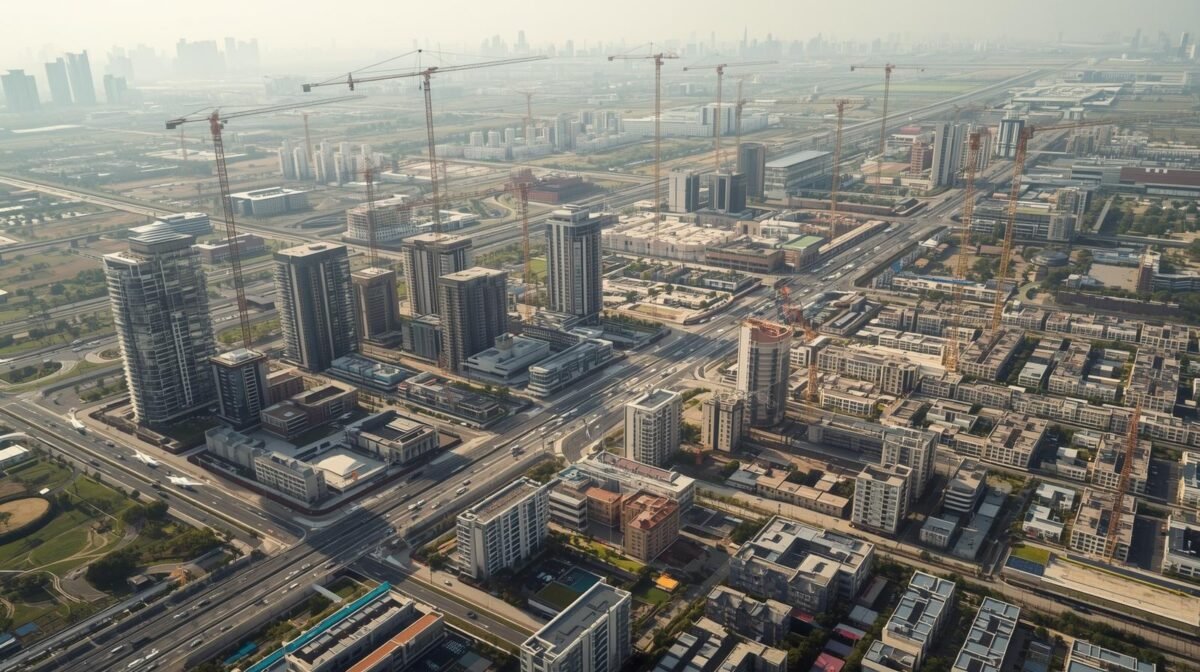Estimated reading time: 5 minutes
The Punjab government has moved closer to restarting the Aerotropolis extension near Mohali by shifting from its earlier voluntary pooling scheme to the conventional route of land acquisition. Officials confirmed that the process is now anchored in the framework of the Land Acquisition Act, 2013, which requires social and environmental impact assessments before any transfer of land takes place.
The project, covering 3,400 acres, is expected to cost around ₹17,000 crore. Senior government functionaries said the aim is to complete the scheme before December 2026, ahead of the current administration’s term ending in March 2027. If executed on time, the initiative would mark one of Punjab’s most ambitious housing and infrastructure projects in recent years.
The Aerotropolis project, situated near the IT City in Mohali, was initially launched under a voluntary land pooling model. That policy was intended to provide landowners with developed residential and commercial plots in exchange for surrendering their farmland. However, widespread protests from farmers and landholders led to the cancellation of the policy, particularly after criticism that no environmental or social studies had been undertaken before implementation.
Authorities now insist that the project will proceed differently. A government official said approval is awaited to commission the mandated studies, after which objections from landowners will be formally invited. “We are strictly adhering to the provisions of the 2013 Act,” the official noted, stressing that the administration wants to avoid the missteps that derailed the earlier scheme.
The Aerotropolis land acquisition in Mohali carries high stakes, not only because of the financial scale but also because of its potential to reshape the region’s urban landscape. Once complete, the residential township will add six new blocks-E through J-to the existing A, B, C and D blocks. Development in Block A has been delayed due to an ongoing vigilance inquiry linked to alleged irregularities in earlier land allotments.
Under the revised structure, landowners will still receive compensation in the form of developed plots rather than cash. The government has already prohibited sale and purchase of land within the designated areas to prevent speculative transactions before acquisition. Officials argue that this approach ensures benefits for both the state and affected landholders, especially as cash-heavy acquisitions have become increasingly unsustainable for public budgets.
Aerotropolis has long been projected as a flagship urban extension that could generate significant revenue for the state. According to internal estimates, earlier phases covering 1,700 acres under pooling brought in around ₹5,000 crore through instalments paid by allottees. If the new acquisition model progresses without delay, officials believe similar revenues could be achieved again.
The challenge lies in convincing stakeholders that the process will be fair and transparent. Punjab has a history of contentious land deals, and the memory of recent protests over pooling remains fresh among farmer groups. Analysts say the government’s credibility will hinge on whether it genuinely carries out the required studies and allows objections to be heard without bias.
Economists argue that the Aerotropolis land acquisition in Mohali reflects broader tensions in India’s urban development model. With rising demand for housing and commercial hubs, states are under pressure to unlock large tracts of peri-urban land. Yet financial constraints often push governments to move away from traditional cash-based acquisitions. Pooling, joint ventures, and hybrid compensation structures are increasingly common, though each comes with risks of political pushback.
In Mohali’s case, the transition back to conventional acquisition signals both a step back and a recalibration. For residents, the stakes are tangible. The IT City and surrounding sectors have become magnets for investors, professionals, and NRIs seeking property near Chandigarh. New blocks in the Aerotropolis could reshape property dynamics, potentially influencing prices across the tri-city region.
Farm groups are watching the process closely. Representatives have already warned that forced acquisition could reignite protests if landowners feel sidelined. Although the 2013 Act requires consent and offers rehabilitation safeguards, implementation has often proved uneven across Indian states. The Aerotropolis case will test whether Punjab can manage a smooth process without triggering further unrest.
Observers also note the timing. With less than two years before the next state elections, the government faces pressure to showcase tangible progress. Large-scale projects such as Aerotropolis provide a visible marker of development, but the risks of delays, litigation, or protests remain significant. If the project proceeds on schedule, it could emerge as a centrepiece of the government’s record. If it falters, it may reinforce public scepticism about land and housing policies.
For now, the administration appears determined to move forward. Officials maintain that the acquisition process is on track and will align with national legislation. Landowners, meanwhile, remain cautious, waiting to see whether promises of developed plots and commercial spaces translate into reality.
The coming months will be critical as impact studies begin and objections are heard. What unfolds in Mohali may set a precedent for how Punjab approaches land acquisition in other districts where pooling plans were scrapped. As India’s urban expansion continues, the balance between government ambition, fiscal limits, and farmer rights will remain at the heart of policy choices.
The Aerotropolis project is a large-scale residential and commercial township planned near IT City, Mohali. It covers about 3,400 acres and is valued at around ₹17,000 crore. The extension aims to create new housing blocks, commercial hubs, and modern infrastructure.
The voluntary land pooling policy was scrapped due to widespread protests from farmers and landowners. Critics argued that the policy lacked proper social and environmental studies and raised concerns over transparency. As a result, the government reverted to the conventional land acquisition route.
Instead of cash payments, landowners will receive developed residential plots and commercial spaces in exchange for their farmland. This system is intended to provide long-term value and ensure benefits for both the state and the landowners.
The extension will add six new blocks-E, F, G, H, I, and J-to the existing layout. Earlier, Blocks A, B, C, and D were developed, though Block A is under legal scrutiny due to a vigilance inquiry.
The Punjab government aims to complete the Aerotropolis extension before December 2026. Officials have set this timeline to ensure the project is delivered before the current administration’s term ends in March 2027.















